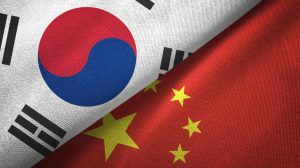South Korea’s economic dependence on China is a well-documented fact. In spite of Beijing’s decision in 2017 to embargo Korean goods and services as punishment for Seoul’s deployment of U.S. anti-missile batteries, South Korea’s reliance on Chinese imports has only grown since then. South Korean industry is particularly reliant on Chinese suppliers for critical components such as large-capacity batteries.
Most Korea watchers in Washington see this economic dependence as a major vulnerability in South Korea’s national security amid rising Sino-American competition. Some, like Cato Institute’s Doug Bandow, go as far as suggesting that the South Korean “shrimp” will be forced to eventually “choose” between the U.S. and Chinese “whales.” This line of thinking implies that South Korea, like the United States’ European partners, will surely fold as soon as its economic lifeline becomes threatened by bad-faith actors in Beijing.
However, such rhetoric does not reflect the actual leverage that China has over South Korea, which is not as significant as Bandow and others make it out to be. The country’s economy is certainly vulnerable to hardship when subjected to Chinese economic coercion. But such pressures rarely induce countries to change their foreign policy outlook. The current fear around Seoul’s economic orientation also misses that Washington has the capacity to shape South Korea’s responses to Beijing.
Cases throughout history show that economic coercion rarely works. Randall Newnham’s analysis of Russo-German relations demonstrates how economic leverage exercised by a wealthier state delivers limited geopolitical returns. Successive governments in Berlin and Bonn found it exceedingly difficult to induce favorable behavior from Russia or the Soviet Union by using monetary incentives. Just as Chancellor Otto von Bismarck failed to undercut a burgeoning Franco-Russian alliance by locking Russian bonds out of the German market in 1885, Chancellor Konrad Adenauer was also unable to compel the Soviet Union to dismantle the Berlin Wall by imposing a unilateral grain embargo in 1963.
China also has a poor track record of using its economic weight to change the behaviors of foreign nations. Seoul still deployed U.S. anti-missile batteries despite Beijing’s informal embargo. Albeit painful, these measures also did not prevent the incoming South Korean administration from considering the deployment of additional U.S. batteries in the country. Moreover, South Korea has continued to bolster its security alliance with the United States, both militarily, through major naval exercises in June, and diplomatically, through the NATO Summit in Madrid.
Where coercion fails to capitalize on economic leverage, Newnham argues that positive economic reinforcement is more successful in fostering changes in the foreign policy outlook of a country. But, he qualifies this thesis with extremely specific conditions that must exist for the wealthier country to effectively use its economic advantages. For example, the Federal Republic of Germany won the Soviet Union’s consent to absorb the Soviet satellite state of East Germany by extending generous loans and general economic aid. The positive aid was effective because it took place concurrently with the economic and political collapse of the Soviet Union, which left Moscow more vulnerable to Bonn’s comparative economic leverage. This case study demonstrates that even if China were to use positive inducements, they will be ineffective unless South Korea is under extreme economic duress.
Thus Chinese attempts to utilize Sino-Korean economic relations as leverage – whether through outright coercion or positive inducements – are unlikely to have the effect desired by Beijing and feared in Washington. If anything, continued Chinese economic coercion will most likely have the opposite effect of incentivizing South Korea to align more closely with the United States in a more comprehensive alliance.
The resilience of South Korea-U.S. relations in spite of Chinese efforts does not mean, however, that Seoul and Washington should rest on their laurels. China is capable of causing massive economic damage against South Korea, even if that coercion is unsuccessful. And although economic pressure rarely yield favorable outcomes for the instigating country, countries on the receiving end can more easily withstand it when they have partners who can substitute the economic role of the coercive actor. Newnham cites that Bismarck’s attempts to use coercive economic policies against the Russian Empire in the late 19th century failed decisively because Russia was able to fall back on French aid.
This where the United States holds the initiative in shaping the geopolitical realities in the Indo-Pacific. Recall that the Trump administration’s hesitance to support its allies weakened U.S. standing across Asia, only increasing the region’s expansive economic ties with China. Along the same line of thinking, Washington’s proactive support can more effectively shape Seoul’s risk-and-reward calculation in its engagements with Beijing.
Such a responsibility is as empowering as it is daunting. It is all the more critical that Washington understands precisely what South Korea’s economic security concerns are vis-à-vis China. The Yoon administration has put economic security at the center stage of its foreign policy agenda, and proponents specifically name the United States as a key partner. The Biden administration’s willingness to develop multilateral responses to Chinese economic coercion is therefore an encouraging sign for South Korea-U.S. relations. Whether future U.S. administrations can continue to do so will be critical not only for safeguarding South Korea’s economic security, but also for continuing to frustrate the effectiveness of Chinese economic coercion.

































